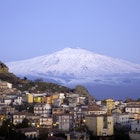
The 15 best places to visit in Italy, from Venice to the Cinque Terre

Nov 19, 2023 • 11 min read

Rome should be the centerpiece of your trip if you’re going to Italy for the first time © Kathrin Ziegler / Getty Images
Home to some of the greatest artworks, historical monuments and food on the planet, and with the kind of varied landscapes that you often have to cross continents to see, Italy elates, inspires and moves its visitors like few other countries.
From its art- and architecture-stuffed cities to its astonishing diversity of natural landscapes – dramatic coastlines, serene lakes, pristine mountains, and those famous rolling hills – picking just a handful of destinations to visit in this wonderful country is no easy task.
So how do you decide where to go? It all depends on what you’re looking for in your Italian odyssey, whether that’s history, art, beaches, hiking or even food. No matter your passion, our list of 15 must-see places in Italy should be your starting point.
1. Rome
Best for history
Once caput mundi (capital of the world), Rome was legendarily spawned by a wolf-suckled boy, developed into a vast empire, rooted itself as the home of the Catholic church, and is now the repository of more than two millennia of art and architecture.
Rome should definitely be the centerpiece of your trip if you’re going to Italy for the first time, but there's simply too much to see in one visit, from the Pantheon and the Colosseum to Michelangelo's Sistine Chapel and countless works by Caravaggio. So do as countless others have done before you: toss a coin into the Trevi Fountain and promise to return.
Planning tip: There’s an overwhelming amount to see here, and with limited public transport in the city center, your choice of hotel can be crucial. Map out the sights you’re most interested in before you book – if you want to be at the Vatican at opening time, for example, don't stay near the Colosseum.
Read more: Italians reveal their under-the-radar vacation spots in Italy
2. Tuscany
Best for a Renaissance fix
From Botticelli’s Venus, emerging coyly from the water in the Uffizi Gallery, to the mind-boggling dome of its cathedral, Florence is a feast for the eyes. This was, of course, the seat of the Renaissance, and there are knock-out names at every turn – Michelangelo in the Accademia, Donatello in the Bargello, Leonardo and Raphael in the Uffizi.
Further afield in Tuscany – Italy's most romanticized region – is an undulating landscape of sinuous cypress trees, olive groves and coveted regional treasures. Glory in the Gothic majesty of Siena and the Manhattan-esque skyline of medieval San Gimignano before exploring the vineyards of Italy's most famous wine region, Chianti, and the rolling, cypress-studded hills of the Val d’Orcia.
Planning tip: You’re best off without a car if you’re sticking to major towns and cities since Tuscany has a good rail network. But if you want to explore the countryside, you’ll definitely need a car.

3. The Dolomites
Best for dramatic mountains
Scour the globe, and you'll find plenty of taller, bigger and more geologically volatile mountains, but few can match the romance of the pink-hued granite Dolomites.
Maybe it's their harsh, jagged summits, the vibrant skirts of spring wildflowers, or the rich cache of Ladin legends. Then again, it could just be the magnetic draw of money, style and glamor at Italy's most fabled ski resort, Cortina d'Ampezzo, or the linguistic curiosity of picture-postcard mountain village Sappada. Whatever the reason, this tiny pocket of northern Italy takes seductiveness to dizzying heights.
4. Amalfi Coast
Best for classic beauty
Italy's most celebrated coastline is a gripping strip: coastal mountains plunge into the piercing blue sea in a prime-time vertical scene of precipitous crags, sun-bleached villages and cliffs rearing up behind. Between sea and sky, mountaintop hiking trails deliver Tyrrhenian panoramas fit for a god.
While some may argue that the peninsula's most beautiful coast is Liguria's Cinque Terre or Calabria's Costa Viola, it is the Amalfi Coast that has seduced and inspired countless greats, from Tennessee Williams and DH Lawrence to Elizabeth Taylor, Virginia Woolf and Jackie Kennedy. Of course, its staggeringly romantic looks also make it one of the best places in Italy for couples.
Planning tip: Yes, driving along the Amalfi Coast is one of the world’s most famous road trips, but often it feels like everyone else on the planet has the same idea as you. Traffic can be nose-to-tail, and parking is effectively nonexistent. Instead, take the ferry between towns or travel by public transport.

5. Pompeii
Best for stepping back in time
Frozen in its death throes, the time-warped ruins of Pompeii hurtle you 2000 years into the past. Wander through chariot-grooved Roman streets, lavishly frescoed villas and bathhouses, food stores and markets, theaters, and even an ancient brothel.
Then, in the eerie stillness, your eye on ominous Mt Vesuvius, ponder Pliny the Younger's terrifying account of the town's final hours: “Darkness came on again, again ashes, thick and heavy. We got up repeatedly to shake these off; otherwise, we would have been buried and crushed by the weight.”
Planning tip: If you have time, the other major city destroyed by the eruption, Herculaneum, is also worth a visit. Much smaller than Pompeii, its buildings are better preserved, and the location – surrounded by its modern descendant, Ercolano – makes the site even more piquant. Like Pompeii, it’s easily reached on the Circumvesuviana train.
6. Emilia-Romagna
Best for foodies
In a region as overwhelmingly foodie as Emilia-Romagna, it's only natural that its capital, Bologna, is dubbed “La Grassa” (the fat one). Many belt-busting Italian classics hail from here, including mortadella, tortellini and tagliatelle al ragù. Shop in the deli-packed Quadrilatero district – home to food stalls since medieval times – then hop on the train for an afternoon in Modena for world-famous aged balsamic vinegar.
Leave room for Parma, hometown of parmigiano reggiano cheese and the incomparable prosciutto di Parma. Wherever you plunge your fork, toast with a glass or three of Emilia-Romagna's renowned Lambrusco – a world away from the sickly sweet wine that was exported in the past.

7. Lago di Como
Best for a slice of luxury
If it's good enough for the Clooneys and vacationing Obamas, it's good enough for mere mortals. Nestled in the shadow of the Rhaetian Alps, dazzling Lago di Como is Lombardy's most spectacular lake. Its lavish Liberty-style villas are home to movie moguls, fashion royalty, and literal royalty, while the lake's siren calls include gardens at Villas Melzi d'Eril, Carlotta, and Balbianello that blush pink with camellias, azaleas and rhododendrons in April and May.
The city of Como itself is a hotbed of arresting architecture, from the Gothic cathedral to Palazzo Terragni – built by the Fascists as their party headquarters, it’s a classic example of Italian 1930s Rationalism and a striking reminder of the atrocities committed by the regime.
Planning tip: Como is like the Amalfi Coast – the roads are clogged, and parking is a huge problem. Instead of driving, use public transport; there’s an excellent ferry and bus network, as well as a train line along the eastern edge of the lake.
8. Sardinia
Best for beaches and coastline
The English language cannot accurately describe the varied blue, green and – in the deepest shadows – purple colors of Sardinia’s seas. While models, ministers and perma-tanned celebrities wine, dine and sail along the glossy Costa Smeralda, much of the island – the Med’s second largest after Sicily – remains a wild, raw playground.
Explore its rugged coastal beauty, from the tumbledown boulders of Santa Teresa di Gallura and the wind-chiseled cliff face of the Golfo di Orosei to the windswept beauty of the Costa Verde's dune-backed beaches.
But spend time inland too, and you’ll find some of Europe’s finest prehistoric remains: mysterious nuraghi (megalithic buildings), burial sites so grand they’re known as “giants’ tombs,” and the mountain villages of Barbagia, where locals still practice centuries-old traditions.

9. Naples
Best for sheer italianità
Pompeii, pizza and a whole lot of panache – Naples is a city like no other. Layered like lasagna, each strip of history on top of the last, this is a place where (underground) you can walk along ancient Greek and Roman roads, while at street level there are sumptuous churches, baroque palaces and Maradona – Maradona everywhere.
Outside the city, Vesuvius looms over the time capsules of Pompeii and Herculaneum, while in town, living in the shadow of a volcano gives life a sense of urgency. All that makes for a place like nowhere else.
Planning tip: Naples becomes less chaotic from the water. Taking the ferry isn’t only an option if you’re going to islands like Ischia and Procida – you can also take a boat from the city to Sorrento, Positano and the Amalfi Coast.
10. Venice
Best for a fairytale city
“Unique” is an overused word, but in the case of Venice, there’s no better description. This really is a dreamscape of intricately carved palazzos, gilded churches and world-class museums, all floating on water and crisscrossed by quiet canals.
Avoid the temptation to do a quick drop-in visit to see the main sights – the real Venice is in the silent canals and narrow alleyways, which cast a spell on all who move through them. Tick off the Rialto Bridge and Piazza San Marco, but then stay on to experience this most precious, and precarious, of cities.
Local tip: This is not the place to run a tight schedule. Leave time to wander the alleys, look inside the churches and artisan shops you pass, and hop on a vaporetto that’ll chug through the islands of the lagoon.

11. Parco Nazionale del Gran Paradiso
Best for hiking
If you're pining for a mind-clearing retreat, lace up your hiking boots and explore over 500km (310 miles) of marked trails and mule tracks traversing “Grand Paradise.”
Part of the Graian Alps and one of Italy's very first national parks, Gran Paradiso's pure, pristine spread encompasses 57 glaciers and alpine pastures awash with wild pansies, gentians and alpenroses, not to mention a healthy population of Alpine ibex, for whose protection the park was originally established. At 4061m (13,323ft), the eponymous Gran Paradiso is the park's only peak, accessed from tranquil Cogne.
12. Mount Etna
Best for thrill seekers
Known to the Greeks as the “column that holds up the sky,” Mt Etna is not only Europe's largest volcano, it's one of the world's most active. The ancients believed the giant Tifone (Typhoon) lived in its crater and lit the sky with spectacular pyrotechnics; today they simply call it idda, or “her.”
At 3326m (10,912ft), she literally towers above Sicily's Ionian Coast. Tackle the climb on foot, on a guided 4WD tour, or stick to the lower slopes, where you’ll find some of Italy’s most exciting wines being grown in the uber-fertile volcanic soil. Sicily is one of the nicest places in Italy to visit, thanks to its extraordinary wealth of history and architecture, its jaw-dropping coastline and, of course, the ever-welcoming Sicilians.
13. Cinque Terre and the Liguria coast
Best for classic coastline
Liguria’s remote Cinque Terre area is coastal Italy at its most spectacular. Five seaside villages wedged between cliffs, encircled by a national park and connected by clifftop footpaths, this is a place where humanity has lived in symbiosis with nature for thousands of years. People have chiseled terraces into the steep cliffs and grown wine here since Roman times; until the 20th century, the locals got about by sea or footpath.
The villages themselves are gorgeous, but spare some time for a hike along the Sentiero Azzurro, the most popular of the paths connecting them. Cinque Terre may be the best known, but Liguria’s coastline is one showstopper coastal village after another – additional highlights include Portofino, Portovenere and Santa Margherita Ligure.
Planning tip: This is another area where it’s not worth driving – there are ferry services, but our favorite option is the train, which runs along the coast and stops at each of the villages.

14. Valle d’Itria
Best for picture-perfect villages
They look like hobbit houses – small conical-roofed cottages, often stitched together to form a bigger home but always fairytale pretty, whatever the size. Puglia, the heel of Italy’s boot, is famous for its trulli, but you won’t find them all over the region.
Head south of Bari, in from the coast and up onto the high karst plateau, and you’ll find the Valle d’Itria, where the green fields around towns like Cisternino and Locorotondo are dotted with trulli. Alberobello is the center of it all – the centro storico of the town is nothing but streets of them. This is one of the prettiest parts of Italy – truly.
15. Milan
Best for a real city break
Italy’s fashion capital often gets a bad rap – too international, too organized, not chaotic enough. Don’t believe it. Where else can you go from a Gothic-style cathedral, started in the 14th century, to masterpieces by Leonardo (his Last Supper fresco in the church of Santa Maria delle Grazie is a showstopper, but so is the Sala delle Asse in the Castello Sforzesco, which he painted as a trompe l’oeil forest bower)?
Milan's restaurants pull together the best food from the Italian peninsula, it’s home to one of Italy’s rare cocktail scenes, and its fashion houses are transforming the city’s modern art scene with venues like Fondazione Prada, an old distillery now housing works by the likes of Jeff Koons and Damien Hirst, as well as putting on top-notch temporary exhibitions.
Planning tip: Milan doesn’t really have high and low seasons like the rest of Italy does; instead, its hotel rates rocket up and down depending on whether there’s a major event in town. Avoid Design and Fashion Weeks if you're traveling on a budget.
Explore related stories

Festivals & Events
10 of the world's best places to celebrate New Year’s EveNov 13, 2024 • 7 min read


 Solo Travel20 expert solo travel tips for women from the Lonely Planet team
Solo Travel20 expert solo travel tips for women from the Lonely Planet teamOct 31, 2024 • 11 min read


 Road TripsThe 11 best day trips from Rome from medieval villages to ancient wonders
Road TripsThe 11 best day trips from Rome from medieval villages to ancient wondersOct 17, 2024 • 10 min read



